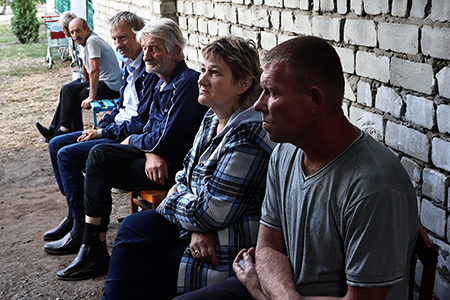"I want to tell you that your fact sheet on the [Missile Technology Control Regime] is very well done and useful for me when I have to speak on MTCR issues."
How Will the Russian War in Ukraine End?
September 2024
By James Goldgeier
Since the fall of 2021, when the Biden administration recognized that Russia was preparing to launch a full-scale invasion of Ukraine, U.S. policy has been to help Ukraine and President Volodymyr Zelenskyy’s government survive while avoiding a direct NATO-Russian war. U.S. President Joe Biden led the alliance and its global partners to provide robust military assistance, but he has been careful, as he has often said, not to “start World War III.”1

Biden’s approach has been more cautious than many in the West would have preferred. This caution is particularly manifest in the U.S. constraints imposed on Ukraine with respect to attacking targets within Russian territory. To date, Biden’s policy has helped Ukraine stave off defeat. He also strengthened NATO by facilitating the accession of Finland and Sweden as alliance members.
Containment of Russian aggression will remain NATO’s core role in European security as long as the Kremlin pursues imperialist policies and refuses to live within its 1991 internationally recognized territorial boundaries. Whether the United States continues to lead that effort depends on who wins the presidency in November.
Unlike Biden and Vice President Kamala Harris, former President Donald Trump has been hostile to Ukraine and sympathetic to Russian President Vladimir Putin. Yet, even a U.S. president who wants to continue to assist Ukraine has to decide on two central questions: Is there a theory of victory, and in the absence of total victory, is there a strategy for how to produce an end to the war that preserves a sovereign, independent Ukraine?2
The 75th anniversary NATO summit declaration emphasized an allied commitment “to provide sustainable levels of security assistance for Ukraine to prevail.”3 It did not define “prevail,” which could mean anything from surviving as a sovereign state controlling the territory currently not occupied by Russia all the way up to recovering the occupied territory, including Crimea, in a victory over Russian armed forces. The latter would require much greater assistance than NATO is willing to provide and, given Ukrainian manpower constraints, might be too much to achieve even if greater assistance were forthcoming.
If the goal is to support Ukraine’s ability to achieve sovereignty and security over its territory that is not occupied by Russia, without giving up hope of eventually liberating those occupied lands, then some strategy for how to end the fighting is needed. There could be negotiations between Russia and Ukraine, but the gulf between the sides is large. Putin does not seem interested in offering any concessions and appears to believe he can grind down Ukrainian opposition through a war of attrition.4 Zelenskyy would have to gain political support for accepting Russian occupation of nearly 20 percent of Ukrainian territory.5
Whether the current fighting stops through mutual exhaustion, a ceasefire, or a peace deal, NATO should invite Ukraine to join the alliance. Without the backing of NATO treaty Article 5, Ukraine will not deter future Russian attacks credibly, and thus endless instability will persist along whatever border emerges between Russia and Ukraine.
ENDNOTES
1. Aaron Blake, “Why Biden and the White House Keep Talking About World War III,”
The Washington Post, March 17, 2022.
2. Eugene Rumer, “NATO’s Biggest Test Since the Cold War Is Still Ahead,” Carnegie
Endowment for International Peace, July 9, 2024, https://carnegieendowment.org/emissary/2024/07/nato-summit-ukraine-russia-war?lang=en.
3. NATO, “Washington Summit Declaration,” July 10, 2024, https://www.nato.int/cps/en/natohq/official_texts_227678.htm.
4. Veronika Melkozerova, “Ukraine Wants Peace but Can’t Trust Russia,” Politico, June 13, 2024, https://www.politico.eu/article/volodymyr-zelenskyy-war-in-ukraine-summit-on-peace-negotiations-russia-vladimir-putin/. For a different view that opportunities for a deal existed previously and could again, see Samuel Charap and Sergey Radchenko, “The Talks That Could Have Ended the War in Ukraine,” Foreign Affairs, April 16, 2024, https://www.foreignaffairs.com/ukraine/talks-could-have-ended-war-ukraine.
5. Nicole Gonik and Eric Ciaramella, “War and Peace: Ukraine’s Impossible Choices,” Carnegie Endowment for International Peace, June 11, 2024, https://carnegieendowment.org/research/2024/06/ukraine-public-opinion-russia-war?lang=en.
James Goldgeier is a visiting fellow at the Brookings Institution and a professor of international relations at American University.
